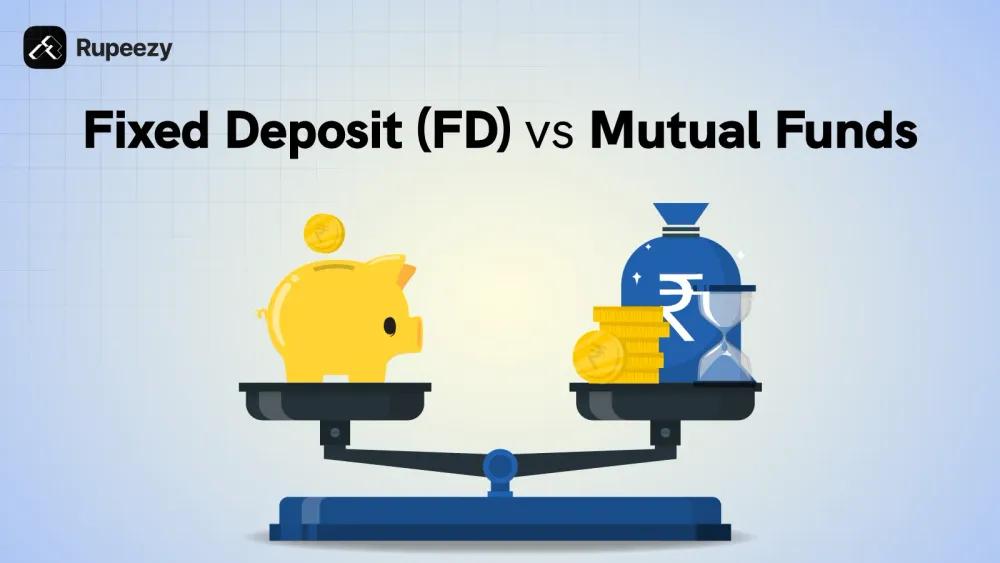FD vs Mutual Fund: Differences, Benefits and Where to Invest


00:00 / 00:00
When there are numerous investment options available, choosing the right one might be difficult for investors nowadays. Fixed deposits and mutual funds are also one of the options that are widely opted for by investors. While fixed deposits offer security and guaranteed returns, mutual funds offer higher returns by investing in various asset classes. However, it is subjected to market risks
So in this article, we will discuss about mutual fund vs fixed deposit. Their benefits and explore which investment option is better for you.
What is a Mutual Fund?
Mutual funds are trusts that collect money from several investors who have similar investment goals. These funds are then invested in various assets like stocks, bonds, and other securities and the income generated from this will be distributed equally among the investors based on their investments.
A professional fund manager manages the investment on behalf of the investors by analyzing the performance of the securities in the market. Thus, the returns of investors are directly linked to the performance of assets or securities you invested in.
The investors are allocated the units of mutual funds based on their investments. The value of these units is termed as ‘net asset value’ and the returns will increase whenever these NAVs increase.
Benefits of Mutual Fund
Higher Returns:
Mutual funds invest their fund in assets like equity, bonds, and commodity markets, which have growth potential in a short period compared to FD, thereby offering higher returns
Professional Expertise:
The fund managers make all investment decisions based on their professional expertise, which tends to deliver better outcomes to investors.
Flexibility in Investment:
You can invest a lump sum or avail of the regular investment plan with no upper limit on the period of investment.
Surpassing inflation:
Unlike traditional savings accounts, a lot of mutual funds especially those invested mainly in stocks or some combination of stocks and bonds have a history of returning more than the rate of inflation.
Diversification:
Mutual funds spread your money over various companies or assets. If one security in your mutual fund performs poorly, the overall impact on your investment will be cushioned by the performance of the other companies in the fund.
What is Fixed Deposits (FD)?
Fixed deposits can be thought of as a vault for money. Here, a lump sum amount is deposited for a fixed tenure in return for a fixed sum of interest credited to your account. It thus makes a sure and reliable way to grow your savings without getting into the risk of market ups and downs.
These fixed deposits are offered by Banks and financial firms where the interest rate offered to you remains constant throughout the term of the investment. Here, the investment period would vary from a few days to several years based on the preferences of the investors.
Being a guaranteed product with zero risks, a fixed deposit is a popular choice for conservative investors.
Benefits of FD
Listed below are some of the principal advantages of investing in a Fixed Deposit:
Guaranteed Returns:
Returns in FD are guaranteed as it has fixed interest rates throughout the deposit and it does not change according to market conditions.
Risk-Free:
The risk in FD is comparatively less as your capital does not fluctuate with market conditions unlike equity or other similar investments.
Compounding returns:
Investors can get the benefit of compounding returns if the interest earned on a deposit is reinvested in their capital resulting in getting interest on both the capital deposit and the accumulated interest.
Flexibility of Tenure:
Based on your preference for investment, you can select any tenure, ranging from a few months to several years, according to your needs and requirements.
Liquidity options:
Commonly FDs are fixed for agreed tenure. However, the investor can liquidate his FD after paying some penalties for premature withdrawal. Investors can also take loans against fixed deposits which are offered by many banks these days.
FD vs Mutual Fund: Key Differences
Parameter | Fixed Deposit | Mutual Fund |
Lock-in period | Fixed-term investment | Flexible redemption options |
Diversification | Invests in single asset Class | Invests in multiple asset class |
Control over investment | Predetermined fixed interest rate decided at the beginning by the banks | The fund manager controls the capital and decides where to invest to get returns |
Suitability | Ideal for risk-averse investors seeking steady income | Ideal for aggressive investors seeking substantial returns. |
Liquidity | Less liquid compared to mutual funds | Highly liquid |
Returns | Fixed-rate Predetermined interest | Fluctuating and Market-driven |
Risk level | Low | Moderate to High |
Mutual Fund vs FD: How to Invest
Investing in Mutual Fund
Open an investment account for investing in mutual funds. You can either do it online or pay a visit to a mutual fund company/ financial advisor personally.
Discover the many varieties of mutual funds in trusted platforms like Rupeezy. Select the one that is most consistent with your financial goals and how much risk you are willing to take on board.
Finally, after selecting the fund, you can either invest in that fund using the lump sum method or through a systematic investment plan.
Explore our latest free tools to easily calculate your fund returns, including SIP calculator, Step Up SIP calculator and Mutual Fund calculator.
Investing in FD
Compare the interest rates offered by different banks and financial institutions. This is something like window shopping, but it is for your money. Pick out the deal that best fits your needs.
After you have found one that will suit you well, open an FD account in your preferred bank.
Now, you need to decide for how long you want to keep your money put in. In addition, you need to decide how much money you are going to be investing.
Finally, Choose if you want the interest to be paid into your account periodically or would prefer the interest to be reinvested in the FD.
Mutual Fund and Fixed Deposit Interest Rates
The interest rates in Mutual funds and Fixed deposits are one of the significant factors that investors will look for while investing in these asset classes. Both have different returns based on their risks.
Fixed deposits have both fixed and floating interest rates and these rates are determined based on the repo rates fixed by RBI. It can vary depending on the bank and even the particular terms of deposit. Therefore, investors should compare the rates across banks and avail benefits.
Mutual funds have capital appreciation rather than interest. The top mutual fund houses invest money in various securities such as stocks, bonds, and commodities. As and when the value of these invested securities increases, the return of the fund will also increase. It also has a risk of loss due to market conditions.
Who should Invest in FD?
New Investors:
Fixed deposits are a good entry point for the new investor. They're like training wheels on your money: safe, steady, and will teach you a lot about investing without exposing you to too much risk.
Conservative Investors
Fixed deposits are appropriate for investors who prefer less risky investment options and looking for steady and predictable returns. FDs also secure the principal amount
The investor which makes it a decent option for conservative investors.
Who should Invest in Mutual Funds?
Diversification Seekers:
Mutual funds are suitable for those who want to invest in different asset classes such as bonds and commodities.
Long Term Investors:
Mutual funds are perfect for long-term investors. They generally do better than bank deposits in the long term, and their fluctuations get ironed out over time.
Early Career Investor:
They offer a convenient, accessible, and potentially high-reward way to grow your money. So, if you're a young investor looking to take control of your financial future, mutual funds are just the way to do it. If you are in your 20s and just started earning, then you have to take some risk and play in the mutual funds wisely. They offer a convenient, accessible, and potentially high-reward way to watch your money grow!
Which is Better, FD or Mutual Fund?
The choice between fixed deposits and mutual funds can vary based on one's financial situation, risk tolerance, and investment horizon
Fixed deposits are steady, and predictable, with limited returns just right for any short-term goal or if you prefer a low-risk approach. In the case of FDs, this is a very conservative option that gives guaranteed returns and is also protected by some insured deposit schemes. They are less risky, with less potential for high returns.
On the flip side, you've got Mutual Funds roller-coaster rides. Much more potential return with an element of the market up and down. They take your money and that of other people in the same pool and are overseen by professionals who invest in individual stocks, bonds, or both.
Also Read: Difference Between PPF and Mutual Fund
Conclusion
The article has elaborated on fixed deposit vs mutual fund and how fixed deposits are different from mutual funds concerning risk. While FD comes with assured returns and the investment is considered low risk, mutual funds are associated with market risks.
When deciding between FD and mutual funds, consider your financial goals and risk tolerance. FDs offer stability and guaranteed returns, but they lack the higher return potential of mutual funds, which also provide market exposure and professional investment management.
Ultimately, the choice between Fixed Deposits and mutual funds depends on your individual preferences, risk tolerance, and financial goals. Make informed investment decisions based on a thorough evaluation of these factors.
The content on this blog is for educational purposes only and should not be considered investment advice. While we strive for accuracy, some information may contain errors or delays in updates.
Mentions of stocks or investment products are solely for informational purposes and do not constitute recommendations. Investors should conduct their own research before making any decisions.
Investing in financial markets are subject to market risks, and past performance does not guarantee future results. It is advisable to consult a qualified financial professional, review official documents, and verify information independently before making investment decisions.

All Category









